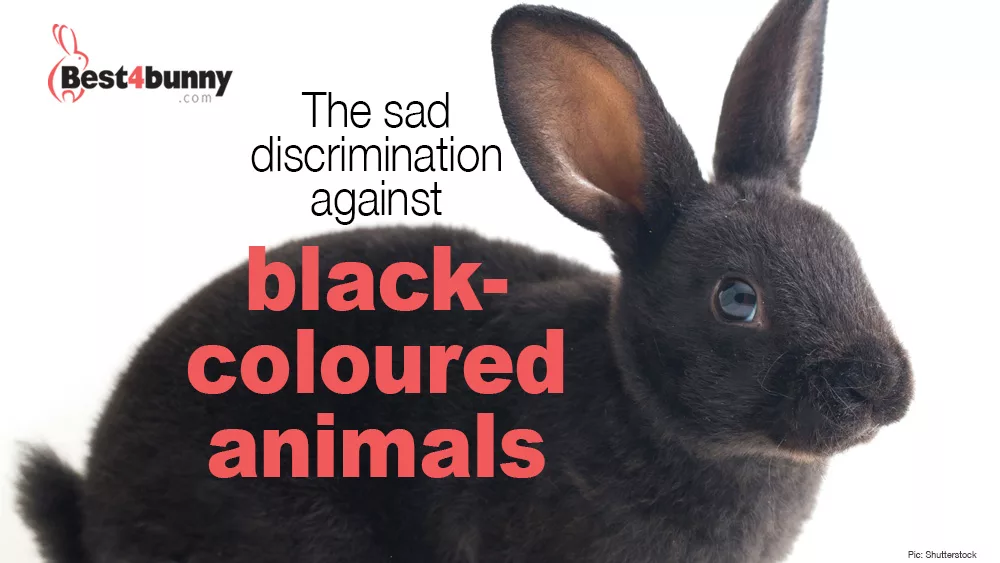
Animals come in many colours and patterns, each with its unique beauty. However, a phenomenon often goes unnoticed or unaddressed: the discrimination faced by black-coloured animals. While it may seem inconceivable to discriminate against animals based on their colour, this prejudice affects countless species. I didn’t believe this discrimination existed until I adopted MINI.
Hi, my name is Andrea, and I’m the mother of Cooper the Pooper and now MINI. Cooper’s social media accounts boomed with interactions and sponsorships because he looked like either Thumper or Totoro. That’s who people associated him with. It was a full-time job keeping up with his social media. After his passing, I adopted MINI. MINI came home in January 2020. Cooper’s true followers/friends welcomed her with open arms and continued to do so. But the traffic on each post, sponsorships, emails, comments, and likes decreased alarmingly. That was discouraging to me, and I felt bad for MINI. I mean, she’s oblivious to her social media. Still, it hurt me that people weren’t interested in her as they were with Cooper. To this day, if I post something about Cooper, traffic increases compared to MINI posts. So yes, discrimination against black-coloured animals is real, unfortunately. Therefore, in this blog, I explore why black-coloured animals face such bias and its consequences on their survival.
Superstitions and Cultural Beliefs:
One of the primary reasons for the discrimination against black-coloured animals is rooted in superstitions and cultural beliefs. Historically, many societies have associated black with darkness, evil, and misfortune. These negative connotations have seeped into the way people perceive and interact with animals, leading to unwarranted discrimination.
Media Influence and Stereotyping:
Media portrayal plays a significant role in shaping public perceptions. Unfortunately, black animals have often been portrayed negatively in literature, movies, and folklore. For example, think about how black cats are often depicted as witches’ companions or symbols of bad luck. These stereotypes perpetuate the bias against black-coloured animals and reinforce discrimination.
Visibility and Popularity Bias:
Another factor contributing to the discrimination against black animals is their visibility. Darker-coloured animals may be harder to spot in certain environments, leading to them being overlooked or undervalued compared to more brightly coloured counterparts. This bias is particularly evident in the pet industry, where animals with striking or unique colours tend to be favoured over black-coloured ones. Striking or unique colours make them “social media worthy”, unlike black-coloured animals, which are harder to photograph. I personally struggle with this when photographing MINI; it is challenging not to over-saturate a photo to make her pop out more. Knowing how influential social media is worldwide, it’s no wonder black-coloured animals are increasingly overlooked. They’re not photogenic.
Adoption Rates:
In the realm of pet adoption, black animals often face longer stays in shelters. The “black dog syndrome” is a well-known phenomenon where black dogs are overlooked in favour of lighter-coloured breeds. Similarly, black cats are less likely to be adopted due to superstitions and the perception that they are less friendly or photogenic.
Fortunately for MINI, this was not the case. Well, at least when it came time for me to adopt her. She did go through two other families that returned her to the same shelter. Poor little MINI suffered through two families in the first year of her life. When the shelter contacted me, they knew this would be it, her forever home. Her last family returned her in a grocery bag. She was so tiny when I picked her up; she was only a year and a half and had suffered so much already.
Let’s Break the Cycle!
Challenging and breaking the cycle of discrimination against black-coloured animals is essential. Here are some steps we can take as individuals and as a society:
Education and Awareness: Promote education and awareness campaigns highlighting the beauty and value of black-coloured animals. Challenge the superstitions and stereotypes associated with them through positive and accurate portrayals in media and educational materials. Writing this made me realize that I may, too, be part of the problem. I should post more highlighting her beauty and promoting it using more hashtags highlighting black-coloured animals. Glad I wrote this blog; otherwise, I wouldn’t have come to this realization!
Promoting Adoption and Support: Supporting animal shelters and rescue organizations that actively promote the adoption of black-coloured animals can make a significant difference. Highlighting their positive qualities and debunking myths can help potential adopters recognize the joy and companionship these animals can bring into their lives.
Media Representation: Encouraging positive portrayals of black animals in the media can play a vital role in reshaping public perception. We can challenge negative stereotypes and inspire a more inclusive perspective by showcasing their beauty, intelligence, and unique characteristics. That’s what I do and continue to do with MINI. I’m not going to stop posting because she gets less and less likes. Oh, not to mention, when I post about Maya, my tuxedo cat, her posts get even fewer interactions. Granted, social media is oversaturated with animal posts, so it’s hard to compete. But being their mother, I notice these changes and can’t help but hurt for them. They are still loved and live happy lives, unknowing of what happens on social media.
Unfortunately, discrimination against black-coloured animals reflects our own biases projected onto the animal kingdom. By recognizing and addressing this issue, we can foster a society that celebrates diversity in the animal world, providing equal opportunities for all creatures to thrive. Let us appreciate the beauty of black-coloured animals and create a world where every living being is valued for who they are, irrespective of their colour or appearance. I know MINI and Maya’s mother would appreciate it!


